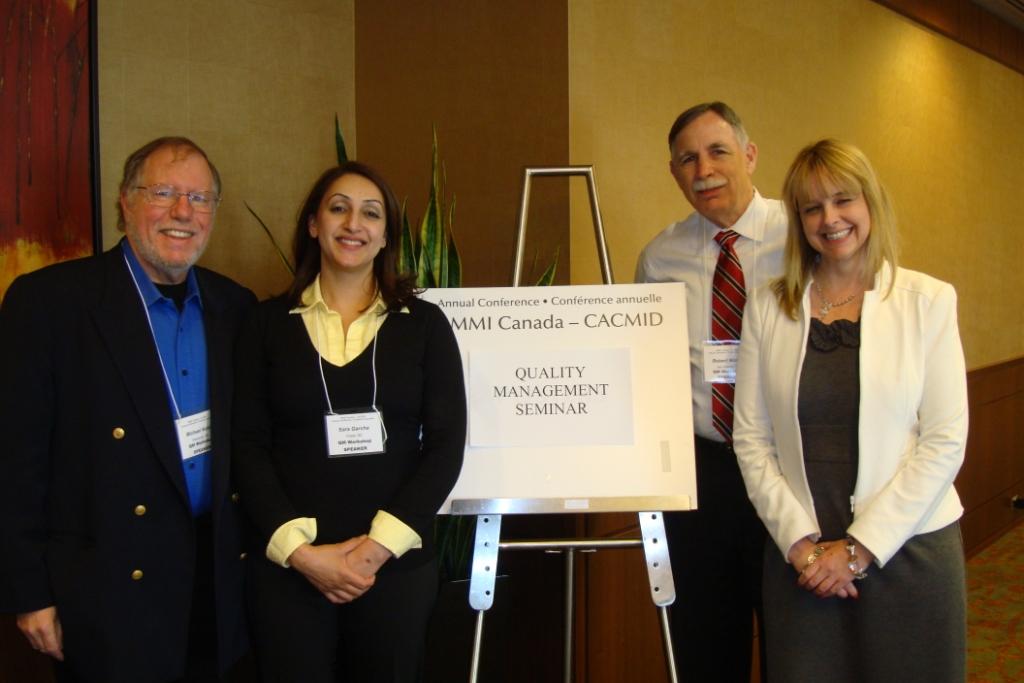Workshop focuses on communication requirements of ISO 15189 Medical Laboratories
DATELINE: MONTREAL, QUEBEC, CANADA—This week, microbiologists, pathologists, and clinical laboratory scientists from across Canada are gathered for the annual conference known as AMMI Canada-CACMID. Reflecting the growing attention given to quality management systems (QMS), there is a dedicated workshop on this topic.
“Communicating Quality” is the title of this special workshop, which was organized and led by Michael R. Noble, M.D., FRCPC., who heads the Program Office for Laboratory and Quality Management at the University of British Columbia. Your Dark Daily Editor, Robert L. Michel, was one of the featured speakers at this workshop.
As regular readers of Dark Daily and The Dark Report know, healthcare systems in nations across the globe are raising the bar on quality as delivered by clinical laboratories and pathology groups. Efforts to improve medical laboratory quality can be divided into two primary areas.
Improving the Quality of the Clinical Laboratory’s Analytical Results
The first primary area for quality improvement involves the integrity and accuracy of the analytical results produced and reported by medical laboratories. Quality in this regard is traditionally under the purview of the lab’s QA/QC (quality assurance/quality control) group. Improvements to the quality of analytical systems and processes in the clinical laboratory are coming from advances in the design and performance of lab testing equipment, and new assays that incorporate state-of-the-art technologies.
Additionally, changes are being made in proficiency testing programs, and in how the medical laboratory staff develop and follow protocols that contribute to a higher quality analytical result.
The second primary area for quality improvement centers on the medical laboratory’s adoption and use of a recognized quality management system. ISO 15189 is fast-becoming the world’s preeminent QMS for clinical laboratories and anatomic pathology labs. ISO 15189 requirements help a medical lab assess the performance of every work process and lab testing activity across the breadth of the organization.
For yesterday’s “Communicating Quality” workshop at AMMI Canada-CACMID, the message was that laboratory management has a responsibility to continually inform and educate the entire laboratory staff—as well as stakeholders such as payers, physicians, and patients—about all aspects of the organization’s quality management system.
ISO 15189 Standards Call for Medical Lab Managers to Communicate
In his presentation, Dr. Noble presented the standards in both ISO 9001 and ISO 15189:2007 Medical Laboratories that specifically make laboratory managers responsible to provide ongoing information to the staff. “In both ISO standards, the language is almost identical on this point,” observed Noble. “Managers are required to take steps to ensure ‘that communication takes place regarding the effectiveness of the quality management system.’”

In Montreal, Quebec, yesterday at the “Communicating Quality” workshop conducted at the AMMI Canada—CACMID conference. Speakers were, from left: Michael A. Noble, M.D., Sara Garcha, Robert L. Michel, and Julie Coffey.
For readers who would like to access these standards, this direct quote can be found in ISO 9001:2008—5.5.3 Internal Communication and ISO 15189:2007—4.1.6 Organization and Management.
“This is a simple and important message to lab managers at all levels in the lab,” Noble added. “During and after implementation of the QMS, regular communications and updates to the entire staff is an essential activity. Using all manner of ways to communicate is vital to the ongoing success of the QMS to support continuous improvement in the laboratory.”
Noble then presented the multiple opportunities and methods medical laboratory managers can use to communicate, inform, and educate their staff members. These included:
- Graphic-based, such as pamphlets, monitoring scales and cartoons;
- Text-based, such as events notices, newsletters, results reviews that cover specific activities like critical events, proficiency testing, and accreditation reviews;
- Discussion-based, which can involve meeting time, seminar time, and events time;
- Action-based, with projects and activities ranging from internal audits to external audits of internal processes and reporting processes.
Noble also provided a list of resources for more information about quality management systems, Lean, Six Sigma, and ISO 15189:
- www.CMPT.ca
- www.POLQM.ca
- www.westgard.com
- darkdaily.com
- www.labqualityconfab.com
- www.iso.org
- www.qualitydigest.com
- www.qmpls.org
The blogs that address medical laboratory issues and quality that were identified by Noble included the following:
- A Dull Day at Work…?
- MicrobeWorld
- The Quality Assurance Blog
- Blog: Quality Management
- Quality Matters
- Juran Blog
- Medical Laboratory Quality
The full conference continues here in Montreal for the balance of the week. It is co-produced by the Association of Medical Microbiology and Infectious Disease Canada (AMMI) and the Canadian Association for Clinical Microbiology and Infectious Diseases (CACMID).
As a final point, this special workshop on quality management systems demonstrates the growing acceptance of QMS by laboratories in Canada. Currently, the provinces of Ontario and Newfoundland require their medical laboratories to be accredited to ISO 15189. It is believed that one or more additional Canadian provinces are preparing to require ISO 15189 accreditation for the clinical laboratories that operate within their borders.
CACMID-AMMI Canada 2011 Annual Conference (Montreal)
Program Office for Laboratory and Quality Management, University of British Columbia



